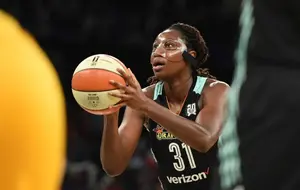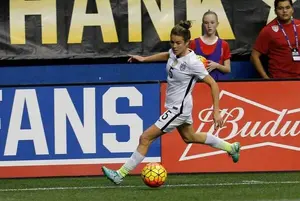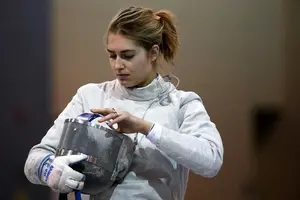With the 2016 Rio Olympics drawing near, Newsday asked past and present members of Team USA if Olympians are wired differently than athletes in a professional sport such as baseball or football. These are their answers.
Tina Charles, women's basketball

“I’ll just have to say your drive and your determination, just what you put in as far as to be one of the top of the top, top of the elite, I guess you could say. And then just being on an Olympic team like basketball, not like fencing or Boxing, so just being on that team, just knowing that you’re one of those that can also be managed on a team. You’re coachable, you know how to put yourself last, you know how to sacrifice for others, so I think for me that was also key as well that they saw.”
Kelley O'Hara, women's soccer

“Yeah, because I mean to be an Olympic athlete, you are the best of the best at your sport, so it just means you have put in the time and the work and the effort and you have the mentality and the athleticism to make it to that level. And for most sports, the Olympics is the pinnacle, which it is for soccer too, obviously we have another tournament in the World Cup, which is also the pinnacle, but at the end of the day, you’re the best of the best.”
Nathan Adrian, men's swimming

"I wouldn't say that we're significantly different. I mean, obviously I think all of us have a very, very innate competitive drive in us. And with that I think we express it in different ways. And for something like swimming, it's just each and every day we're in the pool and we're just swimming laps and we're competing against each other, whereas I don't know, I think other sports it's just different, you know? In terms of training, we're certainly an individual sport, so it's easy to kind of express that, whereas in, like, basketball or anything, on a regular basis in practice it's not as much competing against each other as it is competing with each other. But to give you a short answer, I don't really see a distinct difference between us and other professional sports, no."
Monica Aksamit, women's saber

“To a certain degree, I think so. A few years ago someone told me that not everybody can be an Olympic athlete, and I was like, ‘That’s not true. You just have to sit down and put everything together. Do it.’ But during the four years, I think I’ve learned differently. There’s been so many times, even in high school I was different, middle school. I didn’t really have friends in high school or middle school because all I was doing was fencing. I would come home from school … I caught the 3:20 train, went to practice, fenced, came home at 11, finished my homework that I didn’t do on the train, then I woke up and did it again. So when I moved back home after college, like I have no friends, like no close friends. So from the beginning, that’s all I really cared about is just becoming better and better, be the best fencer that I could be. And even to this day, my friends go out all the time, like it was my friend’s birthday and they’re like, ‘All right, let’s do this,’ or, ‘Come hang out with us.’ And I’m like, ‘No, I can’t.’ There were so many times I canceled concerts my friends had bought tickets, like ‘Oh I bought tickets for us months in advance,’ and I can’t go, so it’s a lot of sacrifice, it’s a lot of dedication being able to remember the entire time what it is that you’re striving for and knowing what’s important for you in the long run, not for the now. So I don’t think just anybody can do that. Like I said, from what I’ve experienced, my friends are like, ‘I don’t even understand how you can be so dedicated, like, come on, you can take a break.’ No, like down the line when I don’t qualify, I don’t want to be like, ‘Damn, I missed that practice for that stupid concert.’ There’s thousands of concerts, but how many Olympic teams can you really make?”
Dagmara Wozniak, women's saber

“I don’t know. That’s a really interesting question. I don’t know if it takes a different wiring, per se. I just think it takes a lot of dedication, and I think what makes people Olympic athletes are the ones that just hold out the longest, who keep working hard, who get knocked down, get back up, get knocked down even harder, get back up again, get knocked down again, and I can keep going on and on. I’ve definitely experienced more losses in this sport than I have successes, but it just makes the success 1,000 times more worth it, and it’s just an amazing experience once you get something – even if it’s like a good practice, it just feels like, ‘Yes! I did it!’ Especially having a string of bad ones. But then getting to the Olympic team and putting that jacket on, it’s just awesome. But I don’t know if we’re necessarily wired different. I just think it’s the same like in work, who gets promoted? The one who stays after, longer, who puts in a little bit more effort, or talks to the boss more, connects with people more. I think it’s those people that really try to propel themselves forward and really try to be the ones on top are the ones that get to call themselves multimillionaires or Olympians.”
David Boudia, men's diving

"I would say yes, for the sole reason that when you look at American television, every Sunday there’s a football game on, or a baseball game on, or basketball. So for a diver, our five seconds of fame is at the Olympic Games that happens every four years. So I think it makes it that much more intense for us, because we’re training 4-5 hours a day, 5-6 days a week, 300 days a year for six dives at the Olympic Games. So it’s just more intense, and so I think when you’re around athletes like diving, competing in the Olympic Games, there’s more of maybe like a go-getter, intense personality. It’s kind of like, ‘Alright, you just need to chill out a little bit’ kind of thing. But I think it’s just wired in us."
Alicia Sacramone, women's gymnstics

"I think the amount of effort and work put in for the genres of sport are similar, but the way we approach our different sport is definitely different. [Football players such as Brady Quinn, Sacramone's husband] have a week-to-week routine that they do, and we have short-term goals for the long-term goal of the Olympics, that it is based on a year versus a week-to-week thing. So it’s a little different, but the dedication and the work ethic are the same. Yeah, our athletic capabilities are definitely vastly different. I mean, I can’t catch a ball if it’s not aimed at me. But Brady can’t do any flips, so it balances out."
..... - Newsday